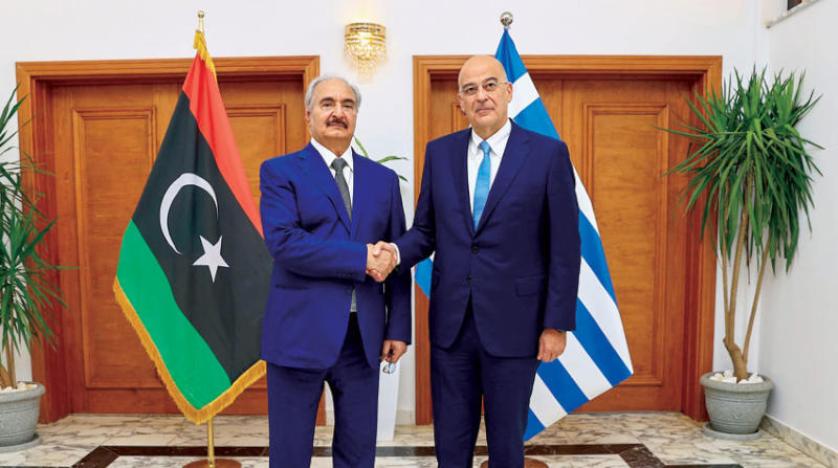As Libya moves to the center of the competition for natural gas, with the proposal of a pipeline between Libya and Greece to be added to the existing line between Libya and Italy, it has become a flashpoint for tensions between Greece, Turkiye and other Mediterranean countries.
The cancelling of a visit by Greek Foreign Minister Nikos Dendias, on November 17th, to the Libyan capital, as he refused to meet with a member of Libya’s National Unity Government, sparked a crisis between the two countries. Dendias’s airplane departed Mitiga International Airport 15 minutes after landing, as he refused to disembark the plane to the VIP hall where Najla Al-Manqoush, Foreign Minister of the National Unity Government was waiting to receive him. Al-Manqoush promptly expressed her anger, asserting in a statement the same day that appropriate diplomatic measures will be taken to protect Libya’s sovereignty and status. The head of the Libyan Presidential Council, Mohamed Al-manfi, sought to lessen tensions by issuing a statement on the same day, affirming that the council was keen to maintain good relations with all the countries that have diplomatic relations with Libya, especially Greece.
Dendias made clear in a tweet after his plane departed for Benghazi that he objected to Al-Manqoush’s presence in the airport. He stated that his visit to Tripoli was canceled because he was scheduled to meet with the President of the Presidential Council, Mohamed Al-Menfi, and the agreement was he would not meet with anyone from the Ministry of Foreign Affairs. Greece considers that the mandate of the National Unity Government has expired, and therefore his meeting with Al-Manqoush would have been considered a recognition of that government and would have signaled a change in his country’s policies towards Libya.
The Turkish dimension
It is noteworthy that Greece had previously objected to an agreement signed by the National Unity Government and Turkey regarding the exploration for oil and gas in the Mediterranean off Libyan shores. The Greek minister had described the agreement as illegal and destabilizing and had repeatedly declared that the Unity Government had no authority to enter into international agreements, as it does not represent the Libyan people.
Bilateral Relations Between Tripoli and Athens have been tense since November 2019, when the former Al-Wefaq government signed an agreement with Ankara to demarcate the maritime borders between the two countries, which was not accepted by Greece. Greece rejected the memorandum of understanding signed two months ago between the Unity Government and Turkey, because it allowed the latter to explore and drill the borders demarcated by the 2019 agreement.
The position of the Greek Foreign Minister reflects contradictions in international stances towards the various players in Libya. For while Dendias refused to meet with a representative of the Unity Government in Mitiga Airport , he departed to Benghazi, in eastern Libya, where he met with the Speaker of the Libyan Parliament, Aguila Saleh, and the commander of the Libyan National Army, Khalifa Haftar, along with other officials.
Turkiye, on the other hand, has had close relations with the successive governments in western Libya, and while it attempts to establish influence through opening channels to all sides in Libya, it is known to coordinate with armed militias in the west. It views the memorandum of understanding it signed with the National Unity Government as an extension of the maritime agreement it signed with Libya in 2019, which has yet to be registered with the UN. From the Turkish point of view, this maritime agreement was a response to the coordination between Egypt, Cyprus, Greece, and Israel, on exploiting Mediterranean gas, and exporting it through pipelines to European markets. Hence, the maritime deal with Libya is meant to enhance Turkey’s influence in the eastern Mediterranean, and to prevent the construction of the pipeline without Turkish consent.
The current crisis between Greece and Libya is therefore deep rooted, as it is linked to the conflict over delineating maritime borders in the Mediterranean which involves several countries, particularly Turkiye. The Turkish-Greek dispute over marking economic zones in the Mediterranean dates back to before 2011, and has now been exacerbated by the intense interest in exploiting oil and gas reserves. Several countries, including France and Italy, as well as countries that share maritime borders with Libya could likely be drawn into these escalating tensions.

